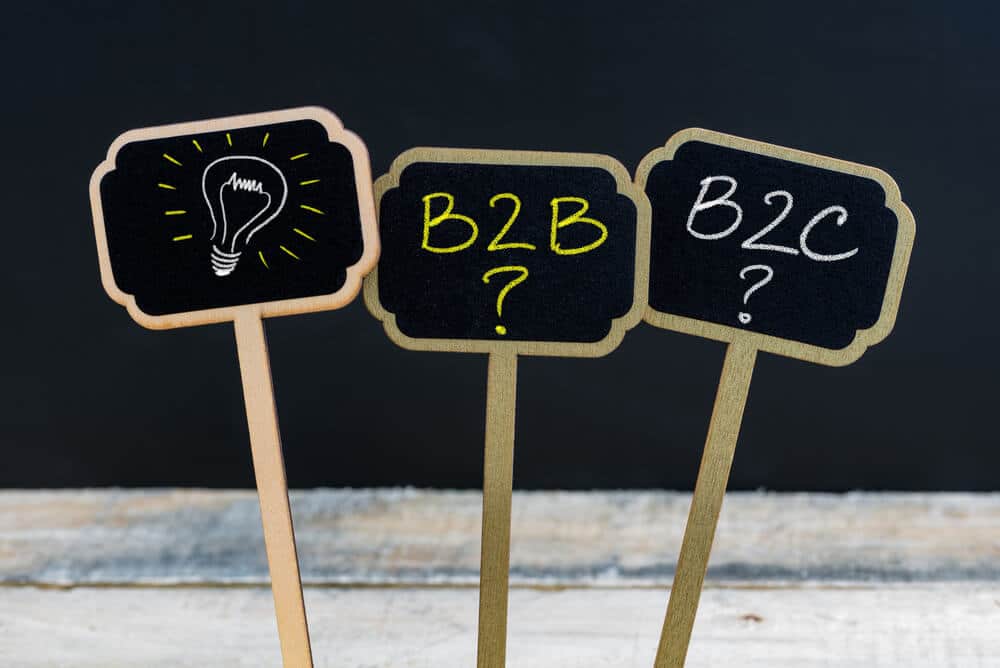Before we delve in to the difference of B2B & B2C, let’s be clear – they both fall under the term H2H (human to human).
At the end of the day, people are people – whether their business is B2B or B2C. So what does each term actually mean?
B2B –Business to Business is the process of selling products or services to other businesses
B2C – Business to Consumer is the process of selling product or services directly to the consumer
Many rules in marketing apply to both sectors; you are always selling to a person, you just have to remember that a person buying for personal use versus a person buying for business purposes require a different marketing approach as their trigger points are quite different.
Think of the last time you bought a product or service; whether you knew them or not, chances are it was the person you bought from. Perhaps it was their knowledge, friendliness or negotiating skills that influenced your decision. Would you have made the same decision without human interaction?
Let’s take a look at some of the key differences & similarities between B2B & B2C marketing and how to tailor your marketing to the different sectors, even when it’s the same product.
Industry Jargon
When selling to B2B it is a good idea to use some industry specific terms that will connect with your target audience. Don’t go too heavy, remember H2H marketing; you are still talking to a person who may well trip over too much jargon and lose interest.
Every human purchase is based on pain; for B2B this could be the pain of a manufacturing process not being efficient enough, or a computer that is too slow for the user… you get the picture.
For B2C customers you need to keep the text short using a simple language, include every point necessary and make it relatable to the consumer. To make the sale you need to solve their problem or be perfect for their need or desire!
Logic V Emotion
There is often less emotion in the purchasing decision of a B2B customer versus a B2C one; it’s all about logic. This means you need to focus on the key features of your product that relate to logic, performance and financial benefits. Again remember the human element; make it your business to know your potential client’s pain, because whatever the logic of their buying process, it is finding a solution to this pain that is important to them. If you get that right your pitch is more likely to get further up the buying chain.
For B2C customers’ emotion plays a key factor in their decision to purchase. Your sales message needs to be clear and to the point; they will be less likely to read a lengthy piece. If your product information triggers an emotional response; hunger, cost, status, desire, for example, their purchase decision can often be made in a matter of minutes or days.
Of course there is still a degree of emotion in B2B transactions. While you’re dealing with a company, there are still people involved; more people means more emotion. A marketing campaign to this target audience has to connect with their pain, motivations and needs, while being backed by logic and financial benefits. Tricky – yes, but rewarding when you get it right!
Brand Awareness
For B2C marketing it is important to focus on brand awareness. Many purchases in this sector are one-off. Without brand awareness customers may not return to you the next time they need new running shoes or hair products.
It’s important to maximize the advertising and distribution channels to get the brand as far and wide as possible – by the way, our custom printed bags are great for this purpose!
A B2C customer will follow your brand on social media and sign up to your email marketing if your posts and mailshots are snappy and eye-catching. They may well make impulse buys on the back of them.
B2B marketing is all about building relationships and repeat business. Your customers here want information, expert advice and a close relationship with a brand they can trust. Marketing material for the B2B sector should be presented in a way that holds the audience’s attention with relevant content that will help in their decision-making process. Getting a B2B customer on board can represent sizeable revenue over a long period.
Instant Gratification v Options
B2C buyers often buy because they want/need it now. A decision can be made in minutes, problem solved and away they go. Make your marketing for these customers all about convenience, ease of use and instant gratification. Have a buying process that is quick and easy; a complicated user experience may result in lost sales.
On the other hand, the longer buying processes of B2B customers require a different effort from you. Catering for the needs of more stakeholders means using your H2H skills; nurturing relationships, providing all the facts in an engaging way that covers any doubts and concerns. Your B2B audience will often be more willing to go with a slower process to get more options like payment terms, consignment stock or user rights for example.
To round things off on the difference between B2B & B2C marketing, and why H2H is the most important factor…
H2H marketing communicates trust and safety, develops long-term relationships with customers, and has more potential to spread by word-of-mouth.
A B2B transaction usually involves more people, taking more consideration before committing as they will usually need to prove a return-on-investment for the purchase.
A B2C transaction is based on emotion and usually decided upon quickly, sometimes immediately. Make your message to-the-point and distribute it through many channels in order to capture the audience at the right time and get the business.
Good luck with your next marketing campaign, and if it involves printed bags, you know who to call!


